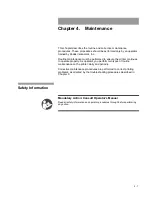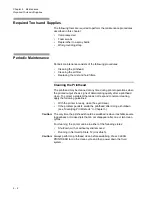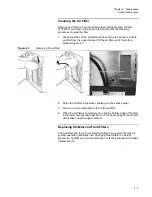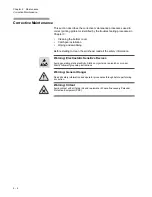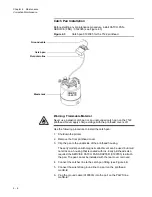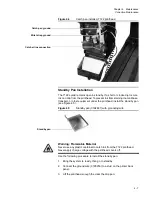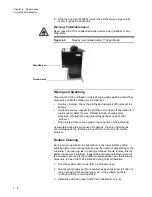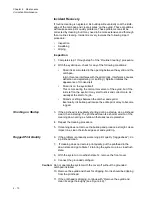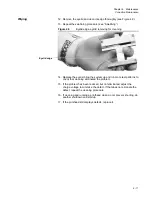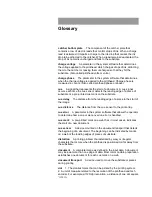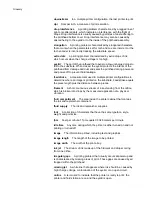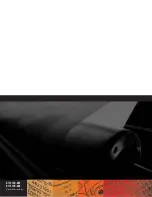
Glossary
downstream In a multiple printer configuration, the last printer to print.
dpi Dots per inch, a measure of print resolution.
drop interference A printing problem characterized by a ragged line of
print or scattered dots, which indicate an interference with the flight of
drops. Drop interference is usually caused by particles of dust adhering to
the printhead bottom cover. Drop interference may also be caused by
dust adhering to the eyelid or to the inside of the printhead assembly.
elongation A printing problem characterized by elongated characters
that occurs when the parameters set for tach and cue are incorrect or the
tach encoder is incorrectly tracking the substrate speed.
extra dots A printing problem characterized by extra drops of ink,
which occurs when the charge voltage is too high.
eyelid The part of the printhead that opens to allow uncharged drops to
fall to the substrate. When closed, the eyelid protects the interior of the
printhead from damage and dust and seals the printhead during power-on
and power-off to prevent fluid leakage.
feedstroke A measurement used in multiple printer configurations to
determine where an image is printed on the substrate. Feedstroke equals
the piece length plus the distance between pieces.
filament A short, continuous stream of ink extending from the orifice,
which is broken into drops by the measured application of a physical
vibration.
fluid compartment The area inside the printer cabinet that contains
the ink and replenisher containers.
fluid supply The ink and replenisher supplies.
font A collection of characters that have the same typeface, style,
weight and point size.
fpm Feet per minute; 1 fpm equals 0.3048 meters per minute.
idle time Any time during which the printer is either turned on and not
printing or turned off.
image The information printed, including text and graphics.
image length The length of the image to be printed.
image width The width of the print array.
ink jet The stream of ink made up of the filament and drops coming
from one orifice.
irregular gaps A printing problem that usually occurs at powerup and
is characterized by missing areas of print. These gaps are caused by air
trapped within the printhead.
missing jet A white line that appears where ink should be, caused by
high charge voltage, contamination of the eyelid, or an open circuit.
online A term used to indicate that the printer is ready to print; the
printer and fluid station are on and the eyelid is open.
Summary of Contents for VERSAMARK DP7122
Page 1: ...Kodak Versamark Inc KODAK VERSAMARK DP7122Printer Operator s Guide ...
Page 2: ......
Page 3: ...KODAK VERSAMARK DP7122 Printer Operator s Guide Block 3 Mod 11 ...
Page 8: ......
Page 24: ......
Page 37: ...3 7 Chapter 3 Troubleshooting Identifying Print Defects Figure 3 4 continued ...
Page 44: ......
Page 56: ......
Page 61: ......


